AliveNatural Health Guides
Bee Products FOR BETTER HEALTH

C. Leigh Broadhurst, PhD

2013 C. Leigh Broadhurst
Photography: Andrew Schmidt, 123RF
Book design, photo editing: John Wincek
Editing: Beth Geisler, Jo Stepaniak
ISBN: 978-1-55312-048-3
Published by Books Alive
PO Box 99
Summertown, TN 38483
931-964-3571
888-260-8458
www.bookpubco.com

Printed in Hong Kong
Library of Congress Cataloging-in-Publication Data
Broadhurst, C. Leigh.
[Health and healing with bee products]
Bee products for better health / C. Leigh Broadhurst, PhD. Revised edition.
pages cm
Revision of: Health and healing with bee products. Vancouver, Canada. ; Summertown, Tenn. : Alive Books, 2007.
Includes bibliographical references.
ISBN 978-1-55312-048-3 (pbk.) ISBN 978-1-55312-098-8 (e-book)
1. Bee productsTherapeutic use. I. Title.
RM666.B378B76 2013
638.16dc23
2012051810
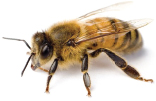
CONTENTS

INTRODUCTION

 he honeybee (Apis mellifera) is the worlds most popular insect. Honeybees are fascinating insects because the entire colony essentially functions as one organism. Outdoor workers are responsible for collecting nectar, pollen, and propolis, with different types of workers performing each specialized task. Indoor workers construct and maintain a safe hive and build honey reserves. Nurse bees manufacture royal jelly and tend the larvae and queen, who is solely responsible for female reproduction. Their society is highly complicated and interdependent, just as human society is.
he honeybee (Apis mellifera) is the worlds most popular insect. Honeybees are fascinating insects because the entire colony essentially functions as one organism. Outdoor workers are responsible for collecting nectar, pollen, and propolis, with different types of workers performing each specialized task. Indoor workers construct and maintain a safe hive and build honey reserves. Nurse bees manufacture royal jelly and tend the larvae and queen, who is solely responsible for female reproduction. Their society is highly complicated and interdependent, just as human society is.
Native to Europe, honeybees have been introduced successfully on every continent except Antarctica. Apiculture (the formal name for beekeeping) has a long history, stretching back to ancient Egypt, Mesopotamia, Greece, Rome, India, and China. According to the US Department of Agriculture, one-third of our food supply depends, directly or indirectly, upon pollination by insects. Bee pollination is worth $16 billion annually to the US agriculture industry alone. Food cropsincluding almonds, apples, blueberries, cranberries, oranges, peaches, pumpkins, and sunflowersrely on honeybees for pollination. Alfalfa and clover, also mainly pollinated by bees, are important crops for livestock forage; in addition, these plants are used to revive agricultural fields because their roots harbor symbiotic bacteria that can capture nitrogen (an essential plant nutrient) from the atmosphere and return it to the soil. Bees are big business!
When I was a child my great uncle kept bees in his backyardonce on the outskirts of town, but now in a densely packed suburb of Washington, DC. My grandfather would occasionally take one of his brothers hives and set it up on his farm. It was on my grandfathers farm that I first learned how bees live and how to care for a beehive. I learned how enjoyable chewing chunks of wax comb could be as I savored that fresh, sweet honey straight from the source. Unfortunately, with so much other farmwork to attend to, my grandfather didnt keep his bee colonies going for more than a few years.
When I was a graduate student at the University of Arizona, Tucson, I realized that even on the campus of a major research university, standard medicine had very little to offer people like myself: young, strong, and healthy, but not always able to cope with the stress, late hours, fatigue, poor eating habits, overindulgence in alcohol, and lingering infections that tend to plague students. Then I heard a fascinating interview on a local radio talk show. The guest was Royden Brown, founder of CC Pollen Company, and he was speaking about the benefits of bee pollen. He mentioned beekeepers in Central Europe living to the century mark and beyond without ever having seen a doctor. With sadness I thought of my grandfather, who had died ten years earlier, his body slowly and painfully wasting away with cancer. Meanwhile his brother, the beekeeper, was still going strong, and in fact lived another twenty-five years.
ORGANIC BEE PRODUCTS
In order to utilize the USDA Organic seal, bee products must be at least 95 percent certified organic in origin. To determine this, they must be analyzed and found to have acceptably low levels of herbicides, pesticides, and heavy metals. In addition, an area well beyond the bees source area must be managed using organic methods and certified as such. Products from hives that are used to pollinate conventional crops cannot be labeled USDA Organic.
While the USDA Organic seal is an important indicator of quality, be aware that many apiaries are small businesses that may not have the time or financial resources to become certified organic. This doesnt mean their products are contaminated. One way to ensure purity and high quality in the absence of organic labeling is to look for bee products that come from wild plants.
One point that made Royden Browns interview so compelling was his discussion of how, throughout history, apiculture has provided medicine, not just food. Beekeepers were among the longest-lived individuals in their villages due to their prodigious use of all the beehive products honey, propolis, bee pollen, and royal jelly (all four of these will be defined and discussed in the chapters that follow).

I began taking generous doses of bee pollen and propolis every day as part of a quest to maximize my strength and healtha quest that continues to this day. I noticed that these bee products significantly improved my well-being, and perhaps not coincidentally, I polished off my doctoral program ahead of most of my peers. Ive since learned that bee pollen is rich in health-promoting phytochemicals. Some of the phytochemicals found in bee pollen can reduce inflammation and promote detoxification. Others are known to lower cholesterol, stabilize and strengthen capillaries, and neutralize free radicals.
Ive now spent more than twenty years keeping up with research into beehive products and designing supplements that incorporate them, along with lecturing on the subject. I eat one tablespoon of bee pollen daily, and Id recommend it to just about anyone. My entire family enjoys pollen, propolis, honey, and royal jelly, and we all support local bee populations by growing extensive vegetable and flower gardens, cultivated without the use of pesticides. I encourage you to do the same, even if youve never gardened. A couple of cucumber plants growing up a trellis will attract bees all summer while also providing you with fresh produce.


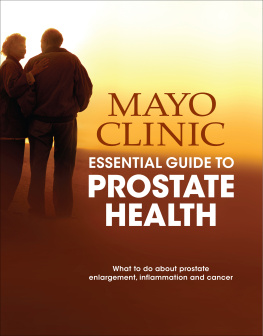
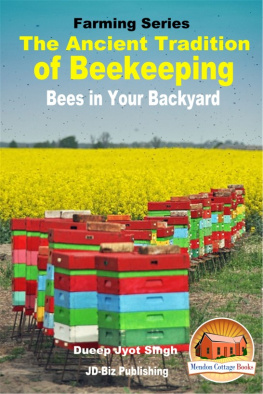
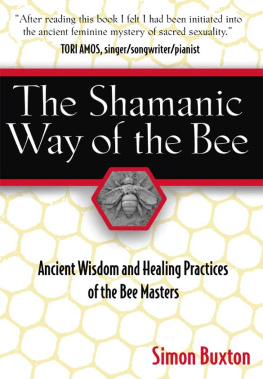
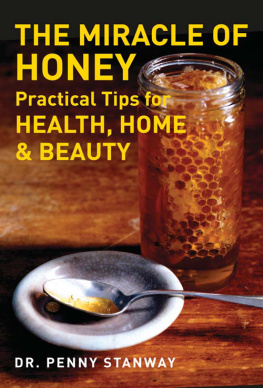
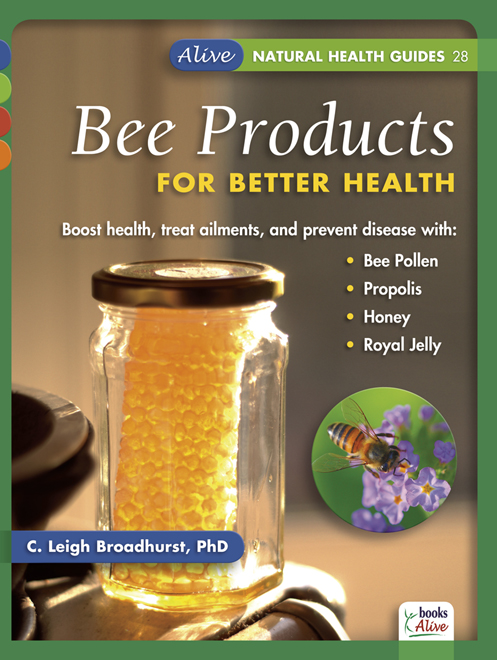






 he honeybee (Apis mellifera) is the worlds most popular insect. Honeybees are fascinating insects because the entire colony essentially functions as one organism. Outdoor workers are responsible for collecting nectar, pollen, and propolis, with different types of workers performing each specialized task. Indoor workers construct and maintain a safe hive and build honey reserves. Nurse bees manufacture royal jelly and tend the larvae and queen, who is solely responsible for female reproduction. Their society is highly complicated and interdependent, just as human society is.
he honeybee (Apis mellifera) is the worlds most popular insect. Honeybees are fascinating insects because the entire colony essentially functions as one organism. Outdoor workers are responsible for collecting nectar, pollen, and propolis, with different types of workers performing each specialized task. Indoor workers construct and maintain a safe hive and build honey reserves. Nurse bees manufacture royal jelly and tend the larvae and queen, who is solely responsible for female reproduction. Their society is highly complicated and interdependent, just as human society is.